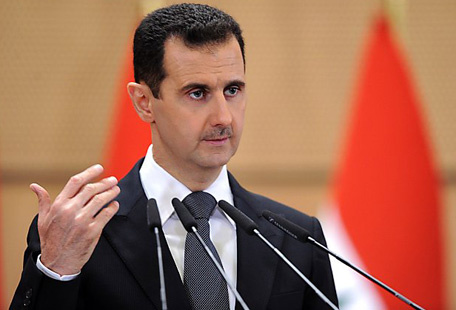Bashar Assad’s Difficult Days

Today, however, Syria’s position has been shattered. A quick look at the position other leaders take in regards to this country is proof of this. The UN Secretary General claims, “Bashar Assad has lost his humanity.” The UN Secretary General is trying to take a moderate position, but with this statement, Syria’s downgrading of its international position is proven. The UN Security Council has also asked Assad to stop the killing of his people, and to interact with them.
However, Russia’s position is of great importance. Russia was among Syria’s main supporters, to the point that it prevented the Security Council from issuing a resolution against Syria. But with the killings going on in Syria, even Russia has not been able to continue with its unlimited support of Syria. President Medvedev has announced that if Bashar Assad does not change his approach he will face a bitter future. When Russia takes such position, China will not continue its support of Syria either.
The US approach to Syria is also noteworthy. US Secretary of State Hillary Clinton officially announced that Assad has lost his legitimacy.
Most important of all is the position taken by the PGCC, which has officially verbally attacked Assad and demanded that he stop the killing of his people. Nabil Al-Arabi, the Secretary General of the Arab Union, asked Syria to put a stop to all violent acts by security forces against civilians.
Saudi Arabia, which is mostly against any development in Arab countries, has announced that events in Syria are not acceptable and summoned its ambassador from Damascus. Kuwait and Qatar have also summoned their ambassadors from Damascus.
Turkey, which mainly tries to play the role of an intermediary and avoids taking any radical positions in the Islamic world, has taken a serious stance against the killings in Syria. Turkey’s Prime Minister Recep Tayyip Erdogan has said that his country’s patience has come to an end, and he sent Davoud-Oglou, his Foreign Minister, to Damascus to warn Bashar Assad.
The international stance against Syria has become generalized. This stance is not limited to officials, and we are witnessing popular uprisings against the killings in Syria. In other words, Syria is not only under pressure by its own people, but also by the popular uprisings going on around the world against Assad’s acts. For example, in Egypt the Youth movement (April the 6th) protested in front of the Syrian embassy for so long that the Syrian ambassador left and went to Damascus. The same types of protests took place in Jordan, Turkey, Tunisia, and even Kuwait.
Syria is the scene of domestic protests and an uprising. Despite the killings, people continue their resistance. The Syrian government believes that it can calm the situation through violent reactions but this has not happened. Every Friday, after Friday Prayers, popular protests take place in different cities. During Ramadan, the Syrian people take to the streets after breaking their fast every evening. This shows that not only have the protesters increased in number, but they have extended and deepened their demands of the government.
On the other hand, some countries in the region have taken advantage of the situation and fully support the protesters. The truth is that the common Syrian demands a guarantee of his and her role in the management of the country.
However, the Syrian opposition is not consistent either. They can be divided into two main groups. First are those who have been opposing the government for a long time and consist mainly of elderly people. These are those who met with Farough al-Sha’r in the Semiramis Hotel and proposed their demands. In this meeting they talked about the release of political prisoners, the killings, freedom of the media, political parties, and free elections and the elimination of the Baath regime. In other words the opposition did not merely talk about the departure of Bashar Assad. These are a group of people who believe in negotiating with Assad. They have talked with Assad in this regard and he has also promised freedom of political parties and media.
The second part of the opposition consists of youth who were in touch with each other through Facebook and Twitter. The leadership of the protests is in the hands of this group. This part of the opposition demands that Assad leaves power, and believes that after the killing of 2000 people by Assad’s government there is no possibility for negotiation or compromise.
A number of these protesters gathered in Turkey to talk about the continuation of the resistance and its future. The main demand of this group is freedom, elimination of tyranny and dictatorship, and peaceful resistance. In this meeting Arab Sunnis, Kurds, and other groups were present. However, there were disagreements among the participants of this meeting.
The uprisings, which started in the small city of Dar’a, have now turned into a serious crisis for the Syrian government and have spread to Damascus as well. Obviously, Bashar Assad is losing his opportunities and it is getting late for any reforms. In the beginning the Americans demanded that reform take place in Syria with Bashar Assad at work and they officially supported him. Most countries took the same stance. But with the actions taken by Assad, he has taken the country to the point where reform is no longer possible.
The storm that began in Tunisia spread though the region and reached a country that (due to its successful foreign policy) was not expected to be affected by unrest. Bashar Assad’s wrong decisions destroyed his reputation among his own people and the international community. Will he be able to overcome these difficult days?

